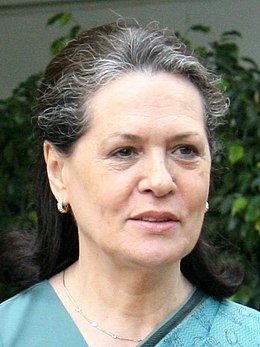The National Democratic Alliance (NDA) is a coalition of right-leaning political parties in India. At the time of its formation in 1998, it was led by the BJP and had 13 constituent parties. Its chairman was late Prime Minister Atal Bihari Vajpayee. Also representing the alliance are L. K. Advani, former Deputy Prime Minister, who is the acting chairman of the Alliance, Narendra Modi, current Prime Minister and the Leader of the House in Lok Sabha; and Arun Jaitley, Leader of the House in Rajya Sabha and Finance minister. The coalition ruled from 1998 to 2004. The alliance returned to power in the 2014 General Elections with a combined vote share of 38.5%. Its leader, Narendra Modi, was sworn in as Prime Minister of India on 26 May 2014.
The Indian National Lok Dal (INLD) is a political party in India, in the state of Haryana. INLD was founded in October 1996 as Haryana Lok Dal (Rashtriya) by Choudhary Devi Lal, who served as Deputy Prime Minister of India in the V.P. Singh's Cabinet and Chief Minister of Haryana twice. His son Om Prakash Chautala is the president.
Rashtriya Lok Dal is a political party in India. Chaudhary Ajit Singh is the founder and the president of the party.He is carrying on the political legacy of his father and former Prime Minister of India, Charan Singh and the original Lok Dal.
India is a federation with a parliamentary system governed under the Constitution of India, which defines the power distribution between the union, or central, government and the states.
Rajesh Verma is an Indian politician and a member of the Bhartiya Janta Party. He was elected to the 13th Lok Sabha in 1999, the 14th Lok Sabha in 2004 and the 16th Lok Sabha in 2014 from Sitapur constituency in Uttar Pradesh state. He is again given the ticket from Sitapur by the BJP for the 2019 General Elections.
Buldhana Lok Sabha constituency is one of the 48 Lok Sabha (parliamentary) constituencies of Maharashtra state in western India. This constituency largely represents Buldhana district in the Lok Sabha of Indian parliament, except Malkapur, which is part of Raver from Jalgaon district of Khandesh region.

The Indian general election, 2014 was held to constitute the 16th Lok Sabha, electing members of parliament for all 543 parliamentary constituencies. Running in nine phases from 7 April to 12 May 2014, it lasted 36 days. According to the Election Commission of India, 814.5 million people were eligible to vote, with an increase of 100 million voters since the last general election in 2009, making it the largest ever election in the world. Around 23.1 million or 2.7% of the total eligible voters were aged 18–19 years. A total of 8,251 candidates contested for the 543 Lok Sabha seats. The average election turnout over all nine phases was around 66.40%, the highest ever in the history of Indian general elections.
Akola Lok Sabha constituency is one of the 48 Lok Sabha (parliamentary) constituencies in Maharashtra state in central India.
Amravati Lok Sabha constituency is one of the 48 Lok Sabha (parliamentary) constituencies in Maharashtra state in western India.
Ramtek Lok Sabha constituency is one of the 48 Lok Sabha (parliamentary) constituencies in the state of Maharashtra in western India. The constituency did not exist during the Indian general elections of 1951-52 for the 1st Lok Sabha. It was created for Indian general election, 1957 for the 2nd Lok Sabha, with abolition of the Amravati West constituency in the neighbouring Amravati district.
Chandrapur Lok Sabha constituency is one of the 48 Lok Sabha (parliamentary) constituencies of Maharashtra state in western India. This constituency is spread over Chandrapur and Yavatmal districts.

Rae Bareli Lok Sabha constituency is one of the 80 Lok Sabha (parliamentary) constituencies in the northern Indian state of Uttar Pradesh. Presently, Sonia Gandhi is Member of Parliament since 2004. This constituency is considered a bastion of the Indian National Congress.
Chikkodi Lok Sabha constituency is one of the 28 Lok Sabha constituencies in Karnataka in southern India.
Kasaragod is a Lok Sabha constituency in Kerala.
Pathanamthitta Lok Sabha constituency is one of the 20 Lok Sabha constituencies in Kerala state in southern India. It is a newly formed constituency in the Central Travancore region of Kerala for the election of a member of the Lok Sabha. The district, which was previously fragmented into different parliamentary constituencies, was unified into a single Parliamentary constituency as per the Delimitation of Parliamentary and Assembly Constituencies Order, 2008.

A member of parliament in Lok Sabha is the representative of the Indian people in the Lok Sabha; the lower house of the Parliament of India. Members of parliament of Lok Sabha are chosen by direct elections on the basis of the adult suffrage. Parliament of India is bicameral with two houses; Rajya Sabha and the Lok Sabha. The maximum permitted strength of members of parliament in the Lok Sabha is 552. This includes maximum 530 members to represent the constituencies and states, up to 20 members to represent the union territories and not more than two members of the Anglo-Indian community to be nominated by the President of India. The party—or coalition of parties—having a majority in the Lok Sabha chooses the Prime Minister of India.



